Explainer: What Iran’s president-elect Pezeshkian must do before assuming office?
By Alireza Akbari
The Constitutional Council on Sunday confirmed the results of Friday’s presidential runoff election in which Masoud Pezeshkian emerged victorious over Saeed Jalili.
“The validity of the second round of the 14th presidential election has been approved by the Constitutional Council,” spokesman Hadi Tahan Nazif told reporters in Tehran.
The official said the confirmation of runoff election results was relayed to the interior ministry, which announced the results on Saturday morning after a 16-hour voting period.
Pezeskian, a veteran lawmaker and former health minister, garnered 16.4 million votes against Jalili, a former lead nuclear negotiator and head of the top security body, who secured 13.5 million votes out of over 30 million votes cast, with the voter turnout at 49.8 percent.
Pezeshkian will now replace Ebrahim Raeisi, who passed away in a helicopter crash on May 19 in northwestern Iran, along with seven others after three years in the country’s top executive office.
Iran's Constitutional Council confirms runoff election results#IranVotes2024 https://t.co/lz5NJHYJTS
— Iran Election 2024 (@PressTVElection) July 7, 2024
What lies ahead for the president-elect?
Following his victory in the presidential runoff election, the official inauguration of Pezeshkian’s presidency must follow certain protocols specified in the country’s Constitution.
One of the first steps after the confirmation of the result is the official endorsement of the elected president by the Leader of the Islamic Revolution Ayatollah Seyyed Ali Khamenei, in accordance with Clause 9 of Article 110 of the Constitution.
The important first step toward assuming the office of the chief executive, known as validation, entails the official endorsement of the president-elect’s decree by the Leader.
During the validation ceremony, the Leader provides important counsel to the new president, underscoring crucial aspects of governance within the framework of Iran’s Islamic democracy.
The validation ceremony also emphasizes fostering close synergy between the country’s various governing bodies and addressing the myriad challenges faced by the people.
Notably, hours after his election victory was announced on Saturday, Pezeshkian met Ayatollah Khamenei for a long discussion about the country’s affairs and expectations from him.
Ayatollah Khamenei receives Iran president-elect, wishes him successhttps://t.co/c1t5jcdJX5 #IranVotes2024
— Iran Election 2024 (@PressTVElection) July 6, 2024
What happens after the president-elect’s validation?
Following the validation ceremony, president-elect Pezeshkian is required to take part in the inauguration ceremony, another important event mandated by Article 121 of the Constitution.
In the presence of top figures such as members of the Constitutional Council, the parliament speaker and the judiciary chief, Pezeshkian will take a pledge to serve his country as the chief executive.
The culmination of this ceremony will see Pezeshkian affix his signature to the official affidavit, symbolizing his solemn oath of office as the new president of the Islamic Republic.
Ali Akbar Ranjbarzadeh, a lawmaker from the city of Hamedan, was quoted as saying that the parliament will hold the inauguration ceremony immediately after the validation of the presidency by the Leader.
He said that once the president-elect’s team signals its readiness, the inauguration ceremony will be held by the top legislative body, with invitations extended to many foreign dignitaries.
“Vote shows people are the ones that elect.”
— Iran Election 2024 (@PressTVElection) July 6, 2024
Iranian Member of Parliament Zohreh Sadat Lajevardi discusses the importance of the recent presidential election in Iran. #IranVotes2024 pic.twitter.com/IlNuCMDnZE
When will the new cabinet be announced?
Mojtaba Yousefi, a member of the parliament's presidium, was quoted as saying in local media that the inauguration ceremony is most likely scheduled to take place in early August.
He noted that within a couple of weeks following the ceremony, the president will have the opportunity to present his ministerial candidates to the parliament for a vote of confidence.
Following the inauguration ceremony, Pezeshkian will have to present to parliament a list of individuals for various ministerial portfolios within a timeframe of no more than two weeks.
As per Article 133 of the Constitution, the president is tasked with appointing ministers, who subsequently undergo scrutiny and approval by the parliament to secure a vote of confidence.
This crucial step underscores the constitutional process of government formation and the accountability mechanisms inherent in the country’s political system.
Further, as detailed in Article 131 of the Constitution, a contingency plan is outlined in the event of unforeseen circumstances such as the death, dismissal, illness, or prolonged absence of the president for a period exceeding two months.
In such circumstances, or during the transitional period between the conclusion of one presidential term and the inauguration of the newly elected president, the duties of the office are assumed by the first vice president, currently Mohammad Mokhber.
This interim appointment requires the endorsement of the Leader of the Islamic Revolution, ensuring the continuity of governance and effective functioning of state affairs during transition or crisis.
Grok to power classified programs as Musk's xAI secures deal with Pentagon
Iraqi FM tells US envoy: Government formation ‘internal matter’
Israel killed Gaza aid workers in ‘execution style’ massacre in 2025: Report
Participation shrinks at Israeli arms expo in wake of Gaza genocide: Report
Venezuela calls on UN to pressure US for Maduro’s immediate release
Hamas: Israel seeks to break Palestinian abductees’ will through abuse
Former UK ambassador released on bail after arrest in Epstein-linked probe
Hamas condemns Israel’s arson attack on mosque in West Bank, calls for mobilization















 This makes it easy to access the Press TV website
This makes it easy to access the Press TV website